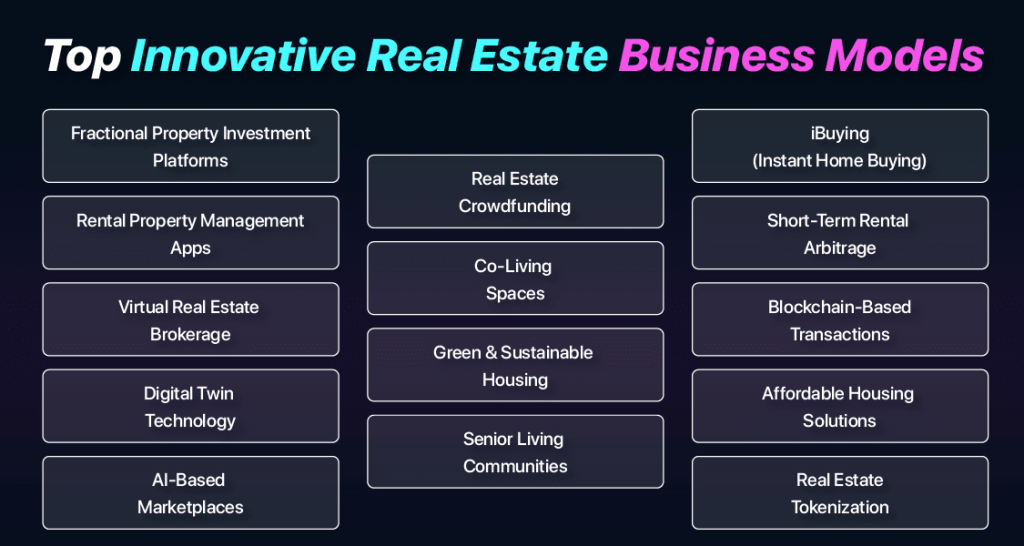Did you know – As per the 2023 survey among 750 CFOs at major companies internationally, about 14 percent of real estate firms used artificial intelligence, with approximately 28 percent in early-stage adoption and 30 percent piloting the technology.
The real estate sector is growing rapidly with Compound Annual Growth Rate (CAGR) of 3.31% between 2025 and 2029, reaching a value of $155.60 trillion by 2029, an expected annual rate. This growth is fueled by the recent technology trends and innovation. Real estate business models are shaping the future of the industry, putting an end to slow dealing and tireless paperwork. And, here is the fun fact: real estate is not just solving problems through the adaptation of technology; it is setting an example in the categories of user base, automation, and artificial intelligence.

The Future of Real Estate in the USA
Real Estate Business Models for USA are future driven and being adapted by millions, led by smarter living, flexible ownership, and sustainable housing. Check trends that are likely to be boosted in future are as follow:
Artificial Intelligence: The Brain Behind the Bricks
What if you find a home that suits your lifestyle? Luckily, this is possible with AI in real estate. AI scans your online behavior, learns your preferences, and provides listings that you might like. It is a budding technology and it has a lot of potential such as forecasting price trends, uncovering hidden gems for investors and much more.
Virtual & Augmented Reality: Home Shopping in a Headset
Who wants to waste weekends visiting from one home to another when you can view them digitally? VR shows properties that haven’t even been completed yet. It’s your personal design assistant—overlaying furniture, paint colors, or full renovations onto your screen in real time.
Blockchain: Trust, Rewritten in Code
Real estate comes with a lot of problems like endless paperwork, legal, and title search reports you can’t verify without experts. Solution is blockchain with its unchangeable digital ledgers, it makes property transactions quick, transparent, and antifraud. Titles become unforgeable and smart contracts execute themselves. It’s the end of the real estate paper chase and the start of a digital revolution.
IoT and Smart Homes: When Walls Gets Smart
Today’s homes are more than cool architecture, they are smart. Smart thermostats know when the room is empty. Leak sensors get activated before the actual problem occurs. Lights, locks, fridges, and even blinds are connected with the internet, quietly managing your comfort and safety. In commercial properties, IoT is the superhero saving energy costs, bettering air quality, and flagging maintenance issues. Your home is no longer where Wi-Fi connects. It is the Wi-Fi
Read Also:- What is The Role of AI in the Real Estate Industry?
Top 14 Innovative Real Estate Business Models

1. Fractional Property Investment Platforms
This enables people to invest in high-end properties by buying fractional interests in them. It reduces the entry point for ordinary investors and returns money through the rental yields. Examples: Fundrise, RealtyMogul. Include this in your real estate business models to get the new buyers.
2. Real Estate Crowdfunding
Crowdfunding websites collect small investments to finance large-scale real estate ventures. Best suited for initial level investors looking for a diverse portfolio and developers seeking funds without old style lending. Most real estate agents and brokers have this facility but if not this is your sign to enquire about it.
3. iBuying (Instant Home Buying)
An iBuyer is a company that purchases houses almost immediately using technology and makes a cash offer based on the market standard. iBuyers finalize the sale transaction online, usually sight unseen, meaning the owner can sell their house in a sale. Leaving a number of steps required in the traditional home-selling method. Examples of iBuyer space are Keller Offers, Upnest, Knock and RedfinNow. Make it a part of your Real Estate Business Models for USA to attract major customers.
4. Rental Property Management Apps
These apps streamline rent collection, maintenance requests, and tenant communications reducing landlords’ manual labor and improving the tenant experience. Honestly, nobody likes to be nudged in their personal space. Real estate management apps allow you to manage property in Paris while sitting in the US. Look for the options like Apartments.com Rental Manager or TenantCloud.
5. Co-Living Spaces
Shared accommodation that provides private rooms with co-living spaces. They are liked by students, young professionals, and remote workers, particularly if they are located in city centers. If your property is in a big place like New York you can implement this marketing strategy for real estate.
6. Short-Term Rental Arbitrage
Startups rent properties for the long term and rent them out short-term on platforms such as Airbnb—making money from the gap without owning real estate.
7. Virtual Real Estate Brokerage
These brokerages operate entirely online, allowing agents to work remotely. Reduced operating cost means better commission rates and a streamlined experience for clients. Implement a real estate investment model if you are living far from main cities. Some examples of popular virtual brokerages include All City Real Estate, Ashby and Graff Real Estate, Central Metro Realty, and KeepYourCommission.com.
Read Also:- 10+ Best Real Estate Websites for 2025: Innovating the Future of Property Transactions
8. Green & Sustainable Housing
Focuses on eco-friendly construction using energy-efficient materials and smart home technology. With demand rising for sustainable homes, this model offers both environment consciousness and profitability.
9. Blockchain-Based Transactions
Real Estate Agency Business Ideas with blockchain enables secure, transparent, and automated property transactions through smart contracts reducing reliance on middlemen and minimizing fraud risk.
10. Digital Twin Technology
Digital twins digital model of a building that serves as its virtual counterpart. They optimize maintenance, enhance energy efficiency, and manage big properties. In simple words, get an exact virtual clone of physical assets which can be used for analyzing, optimizing, and predicting building performance with great accuracy.
11. Senior Living Communities
Ask the rental estate agents about the scope of this in your area and get a consultation with a real estate mobile app development company to create a solution targeted for older adults, combining healthcare services, accessibility, and smart home amenities for safety and convenience.
12. Affordable Housing Solutions
With modular construction or prefab houses, startups are able to provide affordable housing solutions. Public-private partnerships and government incentives mostly back such projects. Introduce it in the business model for real estate investment to attract a pool of 18 million people.
13. AI-Based Marketplaces
Such platforms connect buyers or renters with properties on the basis of AI insights. Predictive pricing, virtual tours, property generation, due diligence, and automated documents are some of its features. Famous platforms using this tech are – Keyway, Zillow, and Redfin.
14. Real Estate Tokenization
Tokenization converts property assets into digital tokens that can be sold or traded. It offers benefits like fractional ownership, improved liquidity, and accessibility for low budget investors.
FAQs
Ans: Buying and rental options are great for short-term profit, whereas PropTech SaaS models are best suited for scalable, long-term growth.
Ans : Dependent. Transaction-based services such as brokerages tend to need a license. SaaS and real estate apps generally do not but always comply with regulations.
Ans: It ranges greatly. A technology platform may start with less than $50,000, but iBuying or development opportunities can involve millions or investor capital.
Ans: Yes. Investigate opportunities through HUD, local housing authorities, or SBA innovation grants particularly for affordable housing or green projects.
Ans: Definitely. Successful startups are mixing models—such as co-living with PropTech technology, or fractional ownership in sustainable housing projects














